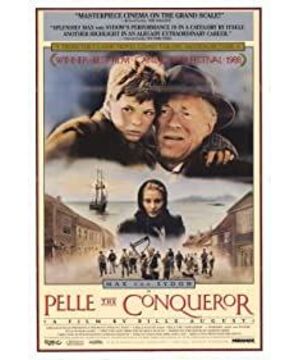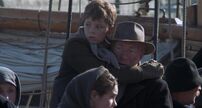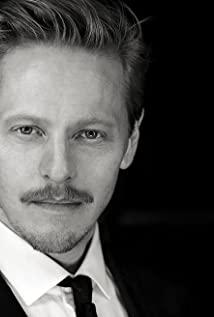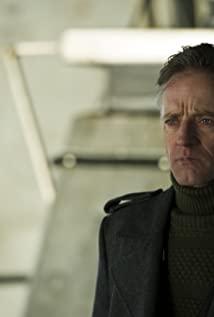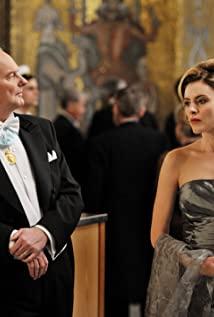... An old widower, with his young son Pell, moved from Sweden to Denmark to make a living. Russ is Pell's blood father, who gave him a flexible body, allowing him to run, dance, and answer the teacher's questions by "moving his ears". Russ is Pell's living father, who gave him food, drink and Lazarus, so that he would not cry all night because of the loss of his mother. Russ is also Pell's emotional father, giving him the most intense love in his poor life, a brand new white knife, a handful of wild strawberries from his hometown, a bowl of stolen fresh milk, a sour but real Surprise and sweet birthday. However, Lars' tall body could not support Pell in a dignified world. His hesitation, timidity, his swallowing his voice, and going back on his promises made little Pell experience frustration and humiliation time and time again. His huge fist could only make a dull sound on the stake, but he didn't have the courage to really smash the head of the oppressor to avenge his son. He told Pell so many illusory and beautiful future visions, but these exciting words were punctured by reality again and again. He was so cowardly, yet so righteous. He was so cramped, yet so generous. You can't blame such an old man, such a father. Yes, even when he turns to sob and flies all over his crooked back, you still can't give him the slightest disdain. "I'm old, I really can't afford it." These were the last words a father said to his son who was about to leave him, so true, so true, so heartbreaking.
He had given him all his father could give him, but there was only so much. Fortunately, there is Eric on the farm - this young man who drinks spirits all day, plays the accordion, and promises to travel around the world in the spring has become the spiritual pillar of little Pell's heart. "When the snow melts in the spring, we can leave here. Take a big boat across the ocean, to the United States, to China, then Australia, Spain..." Little Pell carved a boat on the pillar with his beloved knife The ship, day and night, looking forward to Eric one day taking him across the ocean. Eric challenged the foreman again and again, dissatisfied with the miserable meal of herring all day long, the hard work without rest, and the Christmas without music and laughter. Eric made up for Russ's spiritual defects. He dared to wave his fist at the injustice, dare to speak rudely to the vicious master, and even dared to pick up the iron fork to lead the people to openly resist - he dared to take everything he thought was right. Ideals put into practice. Eric became Pell's spiritual father, not shielding him but guiding him. His passion for life and yearning for freedom infect Pell, who also has dreams.
Although Eric was finally stoned into a dementia, he was at the mercy of the foreman in the horse pen all day long. However, the seed of freedom he planted in Pell's heart took root. And this seemingly slim hope has turned into a happy reality in the little friend Luther. Luther was Pell's best friend, but Luther, an orphan and a disabled man, suffered only discrimination and humiliation in that closed and repressed village. He is determined to go out, even if he goes to the circus to play a clown. Pell didn't believe in circus dreams, but when he saw Luther with a long nose on the ronin circus stage at the fair, he smiled so happily. Not only because he had found friends, but because he saw hope—a hope that he could still be free even if he fell into despair.
Freedom's attraction to Pell was so strong and complete. And it's only about his own freedom - no trumpet to inspire, no companion to inspire, not even a clear enemy. It is just a person who chooses life seriously and walks alone in silence. This freedom is a dark fire in his heart, allowing his thin body to have such tough endurance, resisting hard work, resisting the sea of ice, resisting violence, and resisting humiliation. When Eric was forcibly pushed away by the foreman, Pell reluctantly tore off his neatly dressed cap and hat and refused to accept the new supervisor. Because at that moment, Eric's tragedy suddenly awakened his nerves - there will be no way out if he stays here for the rest of his life. Whether you're promoted to supervisor, foreman, or even a wealthy owner, you're at best confined to this little farmyard, living with these horses, cows, and fat maids forever. lifeless days. So Pell left. Leaving the elderly father behind and on the road alone.
The camera slowly pulled back, leaving only little Peer stumbled on the vast coastline, searching and moving forward, as if Luther, who had absolutely left at the beginning, ran and never looked back. Mel Gibson once shouted the phrase "Freedom" at the end of "Braveheart". It was the inspiration of being a leader for the freedom of a nation, just like the last cymbal of a drum. . Pell left silently, trekking with difficulty and forbearance, unrepentantly searching for the freedom for his own life and dignity, like a restrained and lasting bass drum beat, deeper and more practical. In the original novel, Pell ends up being the trade union leader in Denmark. Movies keep everything on the more poetic and ideal borders. "Go to the United States, go to China, then Australia, Spain..." No one knows whether the life will be a happy one, and no one can say whether those unfamiliar places are free from oppression and cruelty. However, we saw that, on the ravine mountain road, the snow was melting, the sea had been frozen, and another spring was coming.
View more about Pelle the Conqueror reviews


